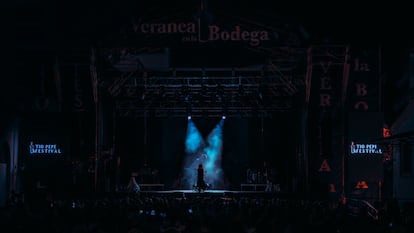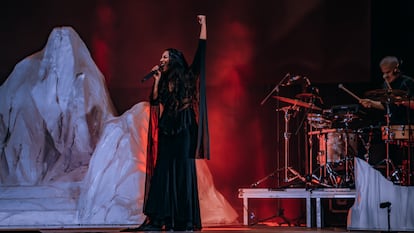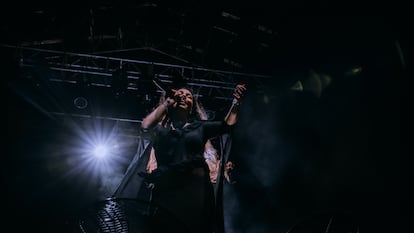María José Llergo invokes her teachers in Jerez before leaving for her European tour.

It's as if she needed this grounding before flying across half of Europe in the fall. María José Llergo (Pozoblanco, 31), one of the flamenco voices serving electronic music and new rhythms with the greatest national projection ( when she won the Goya in 2020 for her song Te espera el mar , from the film Mediterráneo , her career exploded), practically ends her summer season with the concert she gave this Saturday in Jerez de la Frontera (Cádiz), as part of the Tío Pepe Festival . The recital had a lot of the aroma of an old winery (in the most literal sense of the term, the aromas of the oldest fortified wines in the country crept into the concert with every gust of air, coming from the century-old casks of the González-Byass firm, where it was held) and of the ancestral voices with which this artist, still captivatingly young, has built the foundations of her musical career.
As the electronic keyboards, synthesizers, and percussion held fast to the present, Llergo recalled La Paquera de Jerez, the queen of Bulería and a woman with an iron fist who challenged the conventions of her time; the eternal Lola Flores, whose cover she performed with an applauded "Pena, penita, pena," which she inevitably found herself obliged to sing with an elderly person in the audience; and even Camarón de la Isla —a native of the nearby city of San Fernando—with whom she bid farewell to Andalusia in an improvisation that was quickly recognized by an audience that came to remind this Cordoban woman of her origins. She studied "the entire early discography of Triana and Jerez" since she was a child, she explained to EL PAÍS, still in a state of euphoria minutes after the concert.

“There's so much flamenco in this land that it was a huge challenge, and at the same time an immense joy, to be here,” the artist continued after her debut in the Cádiz city of Jerez, one of the great flamenco meccas in the world. The audience, in fact, sent her off with thunderous applause for bulería. “That doesn't happen on every stage, and it's very magical.”
From here, she has three more shows in Spain before leaving in November for what will be her first European tour: Paris, Manchester, London, Brussels, Berlin, Winthertur, Lausanne… Cities that at first glance might seem more inclined to applaud her proximity to electronic music, but where the Cordoba native has decided to take a chance: she'll be with a piano and her voice. "It's much more organic, and I especially like that," she explains. And how will these audiences receive this raw, flamenco-like voice, even though it touches on other types of music? “When someone asks me how I define my music, I like to think about this new way of defining fluid genres, those that don't identify with one or the other. Well, my music is completely fluid. When I feel like going more towards classical music, I do. And when I go more towards flamenco, it's because I truly feel it and I want to. Also, when synths and super- deep electronica come to me, well, that's fine too. Why not? In the end, when it comes to composing, emotion always rules. And that's what ultimately gives it a more electronic, more organic, more acoustic character, whatever.”

Llergo is embarking on this new continental adventure—just as she arrived in Jerez on Saturday—with an album, Ultrabelleza , the second of her career, which is challenging the planned obsolescence of the music industry. Released more than two years ago, she continues to be amazed by how it's received by the audiences wherever she performs. “Being able to tour for more than two years with the same album is something very unusual these days. And that fills me with joy. Because when I create a work, I don't create it thinking about it being a hit of the moment. No, I create it thinking about a legacy I'll leave for the day I'm gone. And the fact of composing slowly, paying close attention to the details, doing it with that same amount of time that stews require, can make it last,” the artist reflects while a crowd of fans awaits her behind the gate of the wine cellars.
Ultrabelleza , which she played almost in its entirety during the concert, is an album in which María José Llergo has poured herself into. She has also portrayed herself, in her "inevitable activism" and her feminist discourse, of social justice, in favor of diversity, in defense of nature... She faces the challenge of contributing something new in her next album. Does this Cordoban woman have anything left to say? "A lot. Let's see, I'm hypersensitive, for better or for worse . And I think it's a gift, because I can channel that hypersensitivity through music and songs. Every day I can share many things: If I open Instagram like everyone else and cry seeing what's happening in Palestine, how can I not say it and how can I not share it?" she asks.

Spontaneously, without knowing it, María José Llergo participates in an open debate in this newspaper about whether artists are obligated to take a public stance on conflicts like the Gaza War. “Ultimately, it's about honesty. I'm not saying all artists have to expose themselves. But for me, it's unavoidable. I wouldn't be me if I couldn't say what I feel. And I'm not going to sacrifice that freedom for success,” she explains, with a gentleness in her words and in the tone of her voice that guides the entire conversation.
In the background, as if reminding her of her roots, a sculpture of one of the most famous names in Spanish wine culture looks out over her: José Ángel de la Peña, the uncle Pepe of Manuel María González Ángel, founder of the Jerez wineries who turned his fundamental support into the brand of the country's most famous fino wine. Llergo has an identical connection with her grandfather of the same name, whom she invokes, without exception, at every concert. A 95-year-old farmer, with no formal education, who taught her to sing "while plowing the field." "He lived through the Civil War as a 6-year-old boy; his life has been very hard. And he's always, always, always in me... At many concerts, we end up chanting Pepe, Pepe, Pepe. And I record it on video and then show it to him, and he gets incredibly emotional," the artist laughs, also getting emotional remembering it.
EL PAÍS



%3Aformat(jpg)%3Aquality(99)%3Awatermark(f.elconfidencial.com%2Ffile%2Fbae%2Feea%2Ffde%2Fbaeeeafde1b3229287b0c008f7602058.png%2C0%2C275%2C1)%2Ff.elconfidencial.com%2Foriginal%2F02b%2F16c%2F51d%2F02b16c51d6577db09a115c29c77b1d62.jpg&w=3840&q=100)